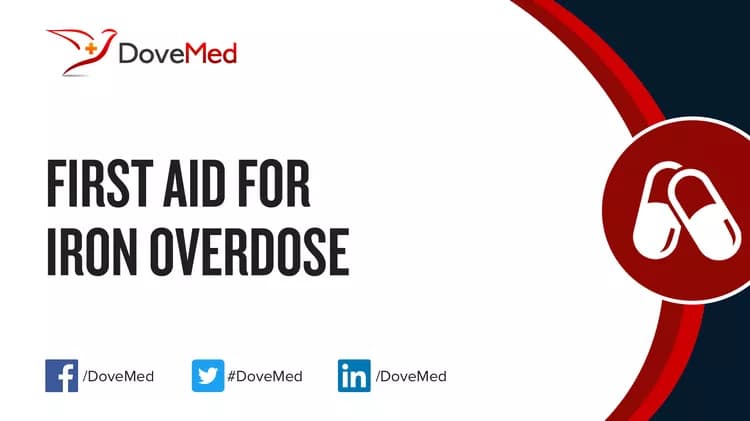What is Iron Overdose?
- Iron is an important mineral element of the human body. It is vital to the growth and development of infants and children
- Iron Overdose is the accidental or intentional consumption of over-the-counter medications or supplements containing iron at higher than the prescribed dosage. Iron Overdose can be particularly serious, if it takes place in children
- The condition is diagnosed based upon the clinical history, combination of signs and symptoms, and additional tests (that may include, in some cases, radiological studies and laboratory tests)
Iron mineral supplements may be sold under the brand names Feosol, Slow Fe, Fergon, Femiron, or Feostat.
What are the Causes of Iron Overdose?
- Intake of iron supplements or multivitamin tablets at higher than prescribed dose can result in Iron Overdose
- This intake could be accidental, or in some cases intentional, to bring self-harm
- Children may be inadvertently given multivitamin drugs that are meant for adults
Note: The drug can interact with other prescribed or non-prescribed medications in the body. Such interactions may enhance the therapeutic effects of the drug or other medications being taken, resulting in undesired side effects (such as an overdose).
Overdosing on any of the following iron supplements can result in signs and symptoms of the condition:
- Ferrous fumarate
- Ferrous gluconate
- Ferrous sulfate
What are the Signs and Symptoms of Iron Overdose?
The signs and symptoms of Iron Overdose can vary from one individual to another. It may be mild in some and severe in others. Several systems of the body, such as the gastrointestinal system, nervous system, vascular system, lungs and skin may be affected.
The signs and symptoms may include:
- Initially, after a few hours, the GI system may be affected with symptoms including vomiting, diarrhea, and nausea
- Headache, lethargy
- Feeling drowsy, dizziness
- Fever and chills
- Taste of metal in the mouth
- Pale skin, flushing
- Shock, convulsions
- Black stools
- Fluid in the lungs
- Decreased blood pressure and high heart rate (weak pulse)
- Fingernails and lips turn bluish in color
- Coma
The symptoms of Iron Overdose may subside after a few hours, but are reported to return after 24 hours.
How is First Aid administered for Iron Overdose?
First Aid tips for Iron Overdose:
- Call 911 (or your local emergency number), if one shows symptoms of, or is suspected of Iron Overdose
- Call Poison Control Center at 1-800-222-1222 (or your local poison control center) immediately, for instructions on how to deal with the overdose
- Confirm that the airways are protected; also, ensure breathing and the presence of pulse
- Try to extract relevant information including the affected individual’s age, weight, general health status, dosage and make of drug containing iron, and the time of intake
- Take individual to emergency room for further treatment
- Always try to take the medication strip/bottle/container to the ER
The emergency medical health professional might take the following steps towards treating the overdose:
- Administer medicines for elimination of drug from the body
- Gastric lavage for elimination of drug from the stomach (irrigation using special solutions)
- Medically manage symptoms, such as abnormal heart rate and breathing difficulty
- Provide breathing support, if necessary
- Administer activated charcoal to prevent absorption of the drug
- Administer fluids by an intravenous drip line
- Preform an endoscopy to remove pills from the gastrointestinal tract or to stop internal bleeding
Who should administer First Aid for Iron Overdose?
First aid for Iron Overdose is administered by healthcare professionals.
- The individual who overdosed, or someone near, should call 911 for emergency assistance (or the local emergency number)
- They should also call the poison control center at 1-800-222-1222 (or the local poison control center) and follow instructions
What is the Prognosis of Iron Overdose?
- The prognosis of individuals with Iron Overdose is usually good, if the symptoms get better within 2 days
- Individuals with mild symptoms have better prognosis than those with severe symptoms. Long-term damage can potentially take place, if appropriate treatment is not considered
- In children, the condition can be severe and may lead to fatalities, if adequate and immediate treatment is not provided
- Liver damage can take place after 2-5 days following the overdose incident
In general, overdoses are common situations in the emergency departments. A majority of the cases are often not fatal, when appropriate treatment is given.
How can Iron Overdose be Prevented?
Iron Overdose can be prevented by:
- Taking the right dose of medication at recommended times
- Refrain from self-medication
- Exercising caution while taking multiple drugs containing iron
- Keeping medications out of reach of children in child-proof containers
- For older individuals and those who tend to be forgetful, medications should be stored in single dose containers with time labels, to avoid multiple dosage
It is important to give your healthcare provider a complete list of prescription and non-prescription medications that are being currently taken. This will help them in assessing the possible drug interactions within various medications and help avoid/prevent accidental or unintentional toxic drug effects.
What are certain Crucial Steps to be followed?
- Call 911 (or your local emergency number) for emergency assistance, if symptoms are life-threatening
- Call Poison Control Center at 1-800-222-1222 (or the local poison control center) and follow the recommend steps
- It would be helpful if the following information is readily available:
- Type, dosage and time of administration of medication
- Age and weight of the individual
- And, the overall health status of the individual
Related Articles
Test Your Knowledge
Asked by users
Related Centers
Related Specialties
Related Physicians
Related Procedures
Related Resources
Join DoveHubs
and connect with fellow professionals


0 Comments
Please log in to post a comment.